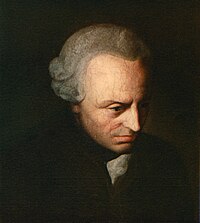
Back Immanuel Kant Afrikaans Immanuel Kant ALS አማኑኤል ካንት Amharic Immanuel Kant AN Imanuwen Kant ANN इम्मानुएल कांट ANP إيمانويل كانط Arabic إمانويل كانط ARY ايمانويل كانط ARZ Immanuel Kant AST
| Part of a series on |
| Immanuel Kant |
|---|
 |
|
Category • |
Immanuel Kant[a] (born Emanuel Kant; 22 April 1724 – 12 February 1804) was a German philosopher and one of the central Enlightenment thinkers. Born in Königsberg, Kant's comprehensive and systematic works in epistemology, metaphysics, ethics, and aesthetics have made him one of the most influential and controversial figures in modern Western philosophy. He has been called the "father of modern ethics",[7] the "father of modern aesthetics",[8] and for bringing together rationalism and empiricism, he has earned the title of "father of modern philosophy".[9][10]
In his doctrine of transcendental idealism, Kant argued that space and time are mere "forms of intuition" that structure all experience and that the objects of experience are mere "appearances". The nature of things as they are in themselves is unknowable to us. Nonetheless, in an attempt to counter the philosophical doctrine of skepticism, he wrote the Critique of Pure Reason (1781/1787), his best-known work. Kant drew a parallel to the Copernican Revolution in his proposal to think of the objects of experience as conforming to our spatial and temporal forms of intuition and the categories of our understanding, so that we have a priori cognition of those objects. These claims have proved especially influential in the social sciences, particularly sociology and anthropology, which regard human activities as pre-oriented by cultural norms.[11]
Kant believed that reason is the source of morality, and that aesthetics arises from a faculty of disinterested judgment. Kant's religious views were deeply connected to his moral theory. Their exact nature remains in dispute. He hoped that perpetual peace could be secured through an international federation of republican states and international cooperation. His cosmopolitan reputation is called into question by his promulgation of scientific racism for much of his career, although he altered his views on the subject in the last decade of his life.
- ^ "Kant" Archived 27 September 2019 at the Wayback Machine. Collins English Dictionary.
- ^ "Kant" Archived 23 October 2014 at the Wayback Machine. Random House Webster's Unabridged Dictionary.
- ^ Wells, John C. (2008). Longman Pronunciation Dictionary (3rd ed.). Longman. ISBN 978-1-4058-8118-0.
- ^ Jones, Daniel (2011). Roach, Peter; Setter, Jane; Esling, John (eds.). Cambridge English Pronouncing Dictionary (18th ed.). Cambridge University Press. ISBN 978-0-521-15255-6.
- ^ "Immanuel". Duden (in German). Archived from the original on 20 December 2020. Retrieved 20 October 2018.
- ^ "Kant". Duden (in German). Archived from the original on 20 October 2018. Retrieved 20 October 2018.
- ^ Jemberie, Abraham Tsehay (2017). "A Critical Analysis of Immanuel Kant's Groundwork of the Metaphysics of Morals". International Journal of Research and Review. 4 (3): 54–75.
- ^ Grenfell, Michael (2017). "Bourdieu, Kant and Art – Michael Grenfell". Michael Grenfell. Retrieved 22 April 2024.
- ^ Bird, Otto Allen; Duignan, Brian (20 July 1998). "Immanuel Kant". Encyclopedia Britannica Online. Retrieved 23 April 2024.
- ^ "Immanuel Kant (1724–1804)". Modern German Thought from Kant to Habermas: An Annotated German-Language Reader. Studies in German Literature Linguistics and Culture. Boydell & Brewer. 16 August 2023. pp. 21–56. ISBN 9781571137708.
- ^ Khan, Naveeda (25 March 2021). "Kant and Anthropology" (PDF). Oxford Research Encyclopedia of Anthropology. doi:10.1093/acrefore/9780190854584.013.311. ISBN 978-0-19-085458-4. Retrieved 9 November 2023.
Cite error: There are <ref group=lower-alpha> tags or {{efn}} templates on this page, but the references will not show without a {{reflist|group=lower-alpha}} template or {{notelist}} template (see the help page).

